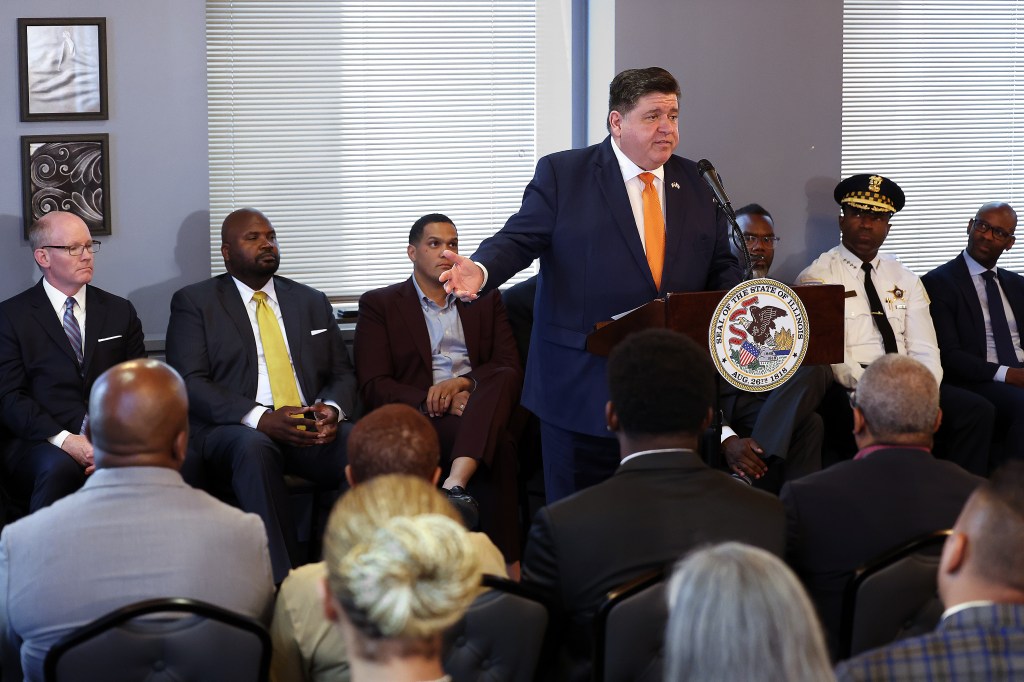In a show of political and private force after a horrifically violent extended holiday weekend in Chicago, civic leaders joined Gov. J.B. Pritzker, Mayor Brandon Johnson and state legislative leaders to announce progress in their commitment to funding community-level violence prevention programs.
The Chicago business community has raised $100 million to support on-the-ground programs, which typically take the form of nonpolice interventions in communities at risk of violence, in a first-of-its-kind effort from the Civic Committee of the Commercial Club of Chicago. In addition, $175 million in state funding for those programs has begun to be distributed, Pritzker said.
The gathering of CEOs, philanthropic leaders, police and violence interrupters came after more than 100 people were shot in Chicago over the extended Fourth of July weekend. Nineteen people died, including an 8-year-old and two family members in a mass shooting in the South Side Greater Grand Crossing community.
Thirteen speakers lined up inside a downtown office building to praise the funding effort, but many acknowledged it’s not enough and that more needs to be done.
“Gun violence I think is a cancer that’s destroying the soul of our city,” former Chicago Public Schools CEO Arne Duncan, who now runs the gun violence prevention organization Chicago CRED, said in opening remarks. “If we’re honest with ourselves, our collective response has clearly been wildly inadequate.”
While Republicans frequently blame Democrats who run many big cities for urban violence, Pritzker, a Democrat who late last week sent a letter to the White House calling for additional federal help to address the violence, put the onus on the GOP for a lack of support for violence prevention programs in the past.
“When Republicans defund programs like the ones that we’re talking about in this room … you end up with more violent crime,” Pritzker said. “It’s Republicans that have caused this problem, and Republicans don’t want to deal with it.”
Over the past five and a half years, the Pritzker administration has budgeted hundreds of millions of dollars toward violence prevention groups that specialize in mediating street conflicts and connecting people most prone to violence, either as a victim or perpetrator, to therapy, job training, substance abuse counseling and other social services.
The weekend violence, while notable, was not out of line with long summer weekends of years past. Asked why violent crime remains so prevalent in spite of the efforts championed by his administration, Pritzker said things would be even worse if none of those programs were in place.
Mayor Johnson and other speakers on Wednesday singled out systemic racism as a major contributing factor to Chicago’s history of violence.
“Economies have been built around Black death,” Johnson said. “The tragedy began before the bullets were fired. The tragedy began in the fact that we have AK-47s on the streets of the city of Chicago. The tragedy, of course, is the fact that we don’t have enough to really fully provide our people with the quality of life that they deserve.”
Also speaking were Senate President Don Harmon, House Speaker Emanuel “Chris” Welch and Chicago police Superintendent Larry Snelling.
The funding for violence prevention programs is part of a holistic approach Pritzker has emphasized in addressing crime in Chicago as alternatives to traditional law enforcement, a position shared by Johnson and his predecessor, Lori Lightfoot.
The business leaders raising money for the public safety efforts, the Civic Committee of the Commercial Club of Chicago, announced in February they had hit $66 million raised of an initial $100 million goal. On Wednesday, they said that goal had been reached.
The state has offered grants to support dozens of violence prevention, youth development and job training organizations in neighborhoods and cities most affected by gun violence. Lawmakers also created the Office of Firearm Violence Prevention under the Illinois Department of Human Services.
A portion of the $175 million pledged by the state and announced Wednesday comes from a pool of roughly $240 million that was budgeted for violence prevention programs around the state when the Reimagine Public Safety Act was signed into law in 2021, according to a Pritzker spokesperson.
Pritzker said public funding for community-based violence prevention efforts needs to be consistent, which hasn’t been the case over the years.
The programs have also changed. In the 2000s and into the 2010s, there was CeaseFire Illinois, which later became part of CureViolence. CeaseFire became well known for employing “violence interrupters,” outreach workers who mediated gang conflicts and other street beefs — a method that was the subject of a 2011 documentary.
But the group often had to lay off its workers when funding from the state and other sources dried up. And law enforcement was often reluctant to work with the group because it hired convicted felons who failed to share street intelligence with police. More recently, there has been more of an understanding between police and street outreach workers about the roles that each side plays in trying to combat violence.
Among those slain over the past weekend were 8-year-old Bryson Orr, his mother, Nakeeshia Strong, and her niece, Capri Edwards, in a mass shooting that also left two other children wounded. That same day, Pritzker sent a letter to President Joe Biden’s administration urging more federal resources for Chicago to combat gun violence.
“Specifically, I urge the White House to support the City of Chicago with funding and resources to help with victim services for families and emergency victim services support,” Pritzker wrote to Stefanie Feldman, director of the White House Office of Gun Violence Prevention.
“Additionally, any funding or resources that could assist the City of Chicago’s public health response in the wake of this incident would be most helpful,” he wrote, “as the victims and those impacted navigate the difficulty of such an occurrence in their community.”














